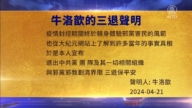【新唐人2013年05月08日訊】中共新領導人習近平擔任總書記以來,一直呼籲要實現「中國夢」。英國《經濟學人》期刊最新一期的文章指出,習近平的「中國夢」沒有具體內容,還潛藏危機。對於中共當局大力推銷的「中國夢」,網民表示,當局不許中國老百姓與中共「同床異夢」﹗究竟「中國夢」隱藏哪些危機﹖為甚麼中國百姓不願與中共一起做「中國夢」﹖請看本臺記者的報導。
《經濟學人》認為,中共新的領導人對未來的「夢想」,應當是為人民服務,而不是打造一個鼓吹「民族主義」的國家。
文章認為這個「中國夢」暗藏危機。第一個危機是:「民族主義在中國大陸復活」。
由於中國大陸在鄰近海域發生小型衝突與爭議的次數增加,中國國內出現愛國的網友要求給日本教訓的激烈言詞。另外,習近平去年12月在中國大陸南部巡視海軍時,提出「海軍夢」,雖然主要目地是平息內部鷹派,但令人擔心的是,這可能預告北京更好戰的立場。
第二個危機是,「中國夢」賦予中國共產黨而非人民更多的權力。
文章說,雖然去年11月習近平提出「中國夢」構想時,是想讓一般民眾有自己的住宅,能送子女上大學,並能享受生活,但是他的焦點似乎放在:強化中共的權力,和強大的軍力。
中國問題獨立評論人士李善鑒:「那他提的這一個中國夢,只不過是換了個名詞,最重要的是基本的人權、社會的安定、人民真正的富裕、真正享有做為人基本的權利。連這些基本的東西,我覺得對中國來講其實都還是一個夢想而已,這些東西最重要,但是他反而不提。」
對於中國很多城市居民來説,他們的「夢」就是擁有一套住房;對於農村居民來説,他們的「夢」就是變成城市戶口,脫離二等公民待遇。
李善鑒:「很多人的想法就不是按照它(中共)想告訴你的範圍讓你去想,這樣他肯定就緊張了,比如《環球時報》發表一些文章說,我們這個夢不是那個夢,就是說你千萬別『夢錯』了。」
美國《紐約時報》一篇名為「美國夢和中國夢不是一回事」的評論文章說,「美國夢」推崇個人主義:只要辛勤耕耘,你就會有收穫。但是,「中國夢」似乎更推崇集體主義,就是:只要你辛勤耕耘,國家就會有收穫。
那麼,到底甚麼是「中國夢」呢?
根據中共喉舌《新華社》表示,「中國夢」就是:所有勞動者都應該「將自己的夢想與國家夢想聯繫起來,履行對國家的義務。」
李善鑒:「中共啊這麼多年來,實際上帶著中國人走的就是一條邪路,整個社會的道德體系都給搞亂了,而且你看它(中共)不生產任何東西,可是這裡邊的官員幾乎控制了社會全部的經濟和財富,這個東西要讓它繼續這麼做下去,我覺得我們甚麼夢都實現不了。」
道德價值體系是根基,社會經濟是枝葉。李善鑒認為,真正的「中國夢」,必須是在中國人民道德、精神全面復甦的條件之下,才具有真實的意義。
李善鑒:「就是要重建中國人的道德,重建傳統的觀念,如果是說一個社會,沒有一個好的、比較高的道德標準,社會裏邊的人沒有一個基本的信仰,所以人為了一點個人利益他就甚麼都敢幹,甚麼壞事他也都能做,那麼這個社會不可能安定,人民也不可能幸福。」
《美國之音》報導,對於中共當局大力推銷的「中國夢」,就中國網民而言,「中國夢」的可笑之處在於﹕習近平帶領下的中共宣傳部門,顯然是要中國人不睡覺的時候,聽從中共的號令步調一致,睡覺做夢也步調一致,一起做當局規定的夢。
採訪/田淨 編輯/黃億美 後製/郭敬
Two hidden crises in Chinese dream
Xi Jinping, the new leader of the Chinese Communist
Party (CCP), has been calling to achieve the Chinese dream since he took office.
An article in the latest issue of British newspaper
The Economist pointed out that
there was no specific content, but rather hidden crises
in Xi’s Chinese dream.
Netizens say that the CCP does not allow people
to aspire to a different dream.
Why do the Chinese people refuse to share the same
Chinese dream, and what are the hidden crises?
The Economist believed that the new leader of the CCP
should take serving the people as a future goal,
instead of creating a country that promotes nationalism.
The article named two hidden crises.
The first crisis: “Resurrection of Nationalism”
in Mainland China.
Due to an increase of conflicts and disputes in China’s
adjacent waters, many netizens have had fierce words for Japan, intending to teach them a lesson.
In addition, Xi Jinping proposed the Navy dream
during his navy visit in December 2012.
Although his purpose was to quell hawks within the navy,
his words might forecast Beijing’s militant stance.
The second crisis is that the Chinese dream gives
more power to the CCP, instead of the Chinese people.
In November 2012, when the Chinese dream
was mentioned, Xi wanted ordinary citizens to have
their own homes, send their children to college,
and enjoy life.
However, his seemed to focus on strengthening
the power of the CCP and the military.
Li Shan Jian, China affairs commentator:
“The Chinese Dream is just a different term.
The most important things are basic human rights,
social stability, the people’s true wealth, and really enjoying basic rights.
These basic things constitute people’s Chinese dream,
but he failed to mention.”
Many urban residents in China are dreaming of
home ownership;
for rural residents, they are dreaming of leaving
second-class citizenship behind.
Li Shan Jian: “Many people do not think according
to what the CCP has outlined.
Thus, the CCP becomes very nervous.
A few articles published in the Global Times say that our
dream is different from that dream, so don’t dream the wrong dream.”
An article published in The New York Times entitled,
“The American dream is different from the Chinese dream,”
said that the American dream respects “Individualism”:
as long as one works hard, one will harvest well.
However, the Chinese Dream seems to respect collectivism:
as long as one works hard, the country will harvest well.
So, what is the Chinese dream then?
According to Xinhua News Agency, the CCP’s mouthpiece,
all workers should link their own dreams with the national dream,
fulfilling their obligations to the state,
and that is what the China dream is.
Li Shan Jian: “The CCP has led the Chinese people to walk
an evil path over the years.
The whole social ethical system has been messed up.
The CCP officials do not produce anything, but they control
almost the entire social economy and wealth.
If this scenario continues, I don’t think we can fulfill
any dream.”
Li Shan Jian believes that the moral value system
is the foundation; social economy is only a branch.
The real Chinese dream must come after the full recovery
of the Chinese people, morally and spiritually, in order to be meaningful.
Li Shan Jian: “That is to rebuild people’s morals
and traditions.
If a society does not have good and high ethical standards
and people do not have a basic belief, this society will not be stable.
They are capable of doing anything (bad)
for a small gain.
That cannot be a stable society, and people
will not be happy in it.”
Voice of America reported that the CCP has vigorously
promoted the Chinese Dream.
Yet, netizens find it laughable that the CCP’s propaganda
department obviously not only wants all people to follow
the central government when they are awake, but also
to dream the CCP’s dream when they are sleeping.




























